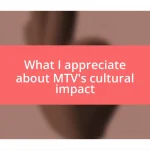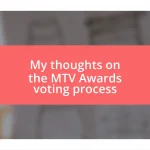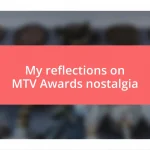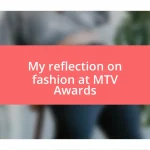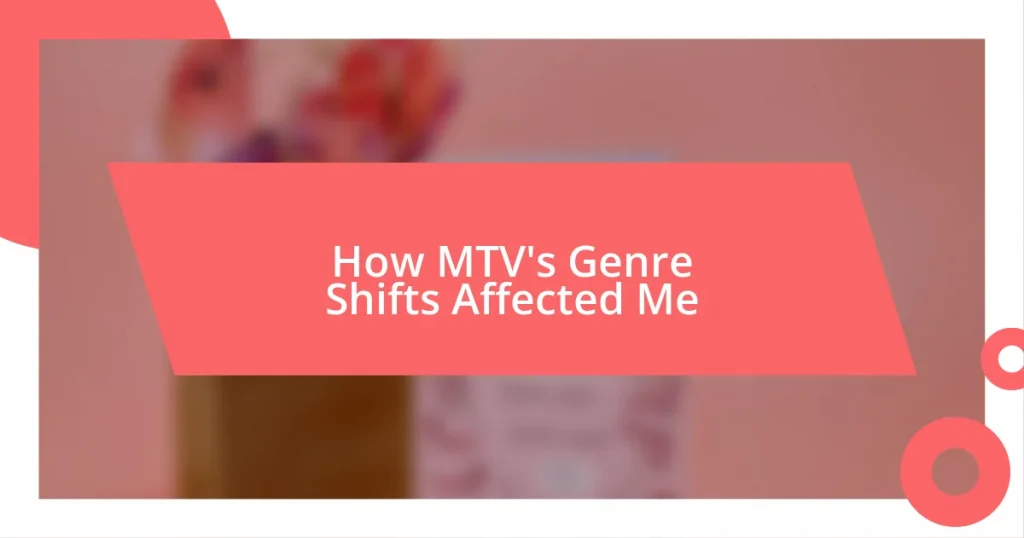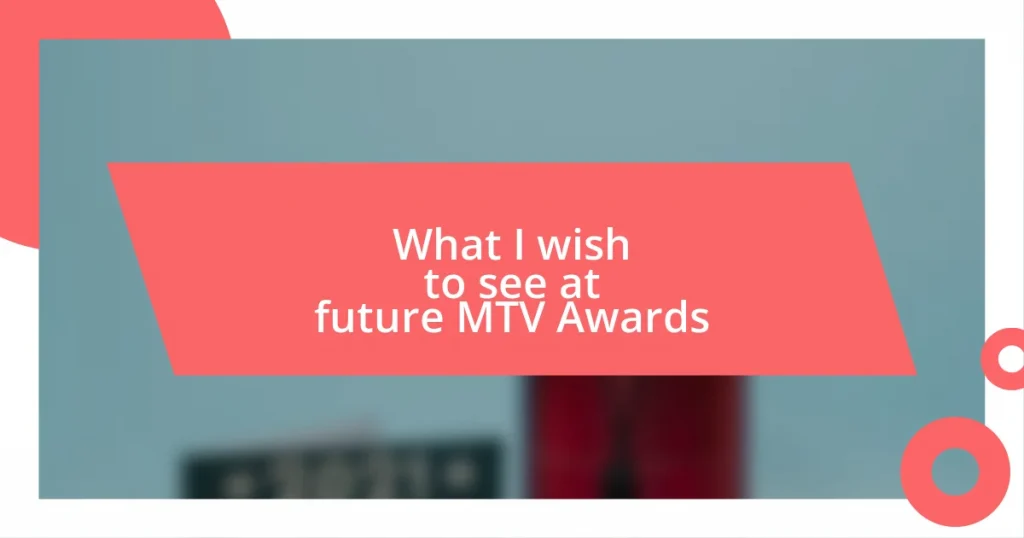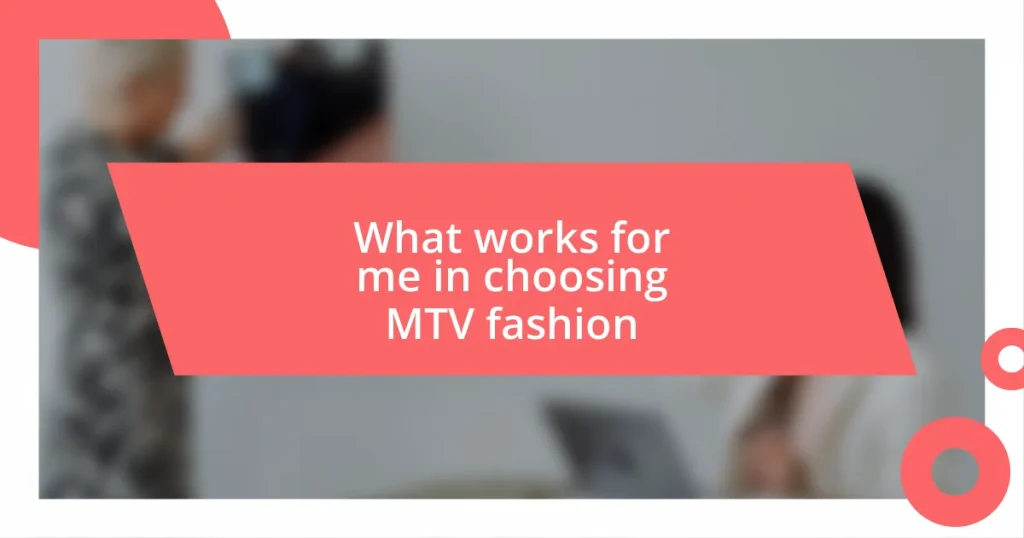Key takeaways:
- MTV’s launch in 1981 revolutionized music consumption, fostering community and cultural discussions through music videos.
- The shift to reality television in the early 2000s transformed viewer engagement, blending personal stories with music and reshaping perceptions of authenticity.
- Genre shifts on MTV encouraged personal exploration and identity development, leading to a deeper appreciation for diverse musical influences and cultural narratives.

Understanding MTV’s Influence
MTV has played a pivotal role in shaping not just music but culture itself. I remember when I first saw a music video that resonated with my own experiences; it was like seeing my thoughts reflected back at me. Did you ever feel a connection to an artist that was amplified through their visuals?
What struck me about MTV’s influence was its uncanny ability to push boundaries. I vividly recall the shocked expressions of my friends when we watched groundbreaking videos for the first time. Those moments opened discussions about identity and rebellion that we hadn’t dared to have before. How often does a single video ignite conversations that linger long after the credits roll?
Moreover, MTV didn’t just showcase popular music; it fostered an entire community around various genres. I often found myself exploring different styles and discovering new artists, which expanded my musical landscape significantly. It’s fascinating how networked culture can guide personal tastes—did you ever start liking a genre simply because it was featured prominently on MTV?

History of MTV’s Evolution
MTV’s evolution has been a fascinating journey, beginning in 1981 as a channel dedicated to music videos. I remember feeling like I was part of a revolution every time I tuned in, swept away by the visuals that accompanied the songs I loved. Can you imagine the excitement of waking up early just to catch the latest video premieres? It felt like a shared experience with countless others, all diving into this new music video culture together.
As the years rolled on, MTV began to expand beyond just music videos. The introduction of reality shows in the early 2000s changed the channel’s landscape significantly. I found myself conflicted; while I initially loved its focus on music, I started to get pulled into the drama of shows like “The Real World.” Was I witnessing a cultural shift? It seemed like the heart of MTV was evolving, and I was left wondering what this meant for artists and storytelling in music.
Today’s MTV still retains its roots but has ultimately transformed into a platform that embraces a wider range of content than I ever expected. Reflecting on this, I often think about how each genre shift allowed me, personally, to explore new music scenes and artists. I feel grateful for those times, as they influenced not only my taste in music but shaped who I am today. Remember the thrill when a new genre hit the screen? It opened doors to a world of artistic expression and exploration that continues to resonate with me.
| Year | MTV’s Focus |
|---|---|
| 1981 | Launch as Music Video Channel |
| 1990s | Expansion to Variety and Dance Shows |
| 2000s | Introduction of Reality Shows |
| 2010s-Present | Diversity in Programming, Emphasis on Culture |

Key Genre Shifts Over Time
Shifts in MTV’s focus have undeniably mirrored the evolving music scene and, in many ways, shaped my own musical journey. I recall the transition in the early 90s when grunge swept in and redefined what rock music could sound like. It was a shock to watch Nirvana’s “Smells Like Teen Spirit” after endless pop videos; I felt an exhilaration that can only come from encountering something so raw and authentic. That era taught me it was possible to express angst and emotion through music—a powerful lesson that resonated deep within my teenage soul.
- 1981: MTV launched, offering non-stop music videos.
- 1990s: A shift to include variety shows and the rise of grunge.
- 2000s: Reality television took the spotlight, blending genres and cultures.
- 2010s-Present: MTV embraced diversity, featuring a mix of programming that challenges traditional music paradigms.
Reflecting on this change makes me acutely aware of how each genre’s rise and fall felt like a personal soundtrack to my life. I distinctly remember dancing in my room, surrounded by posters of my favorite artists, and realizing that every beat seemed to echo my own experiences and emotions. It’s fascinating how these trends can trigger memories and create connections to moments we hold dear.
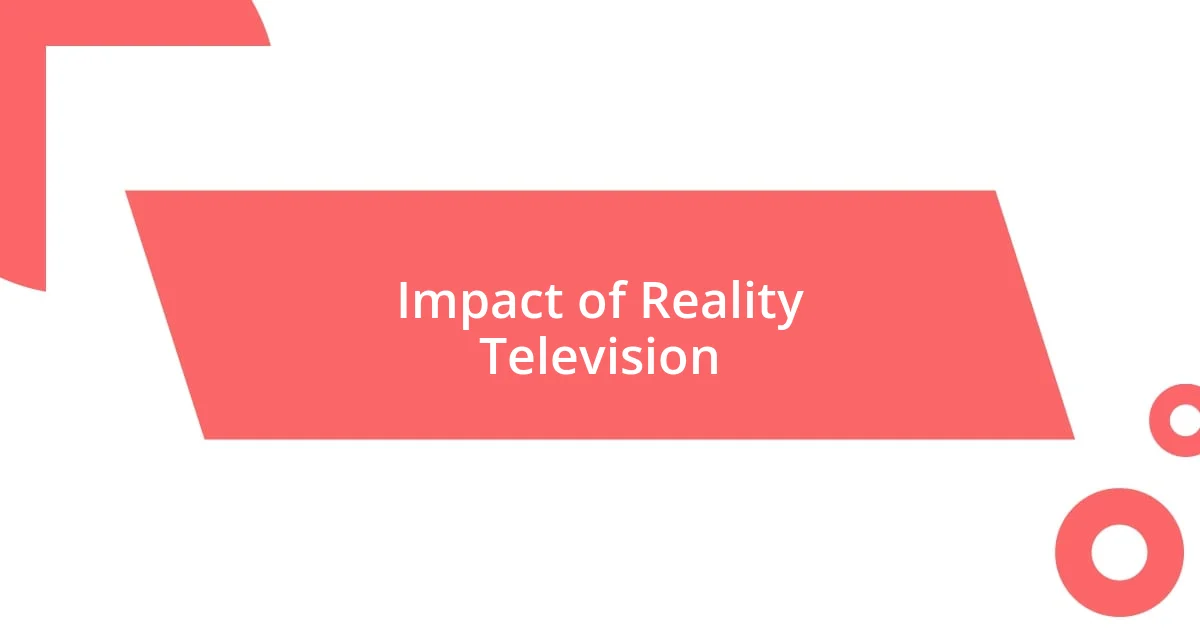
Impact of Reality Television
The rise of reality television marked a pivotal change not only for MTV but also for viewers like me. Suddenly, shows like “Reality TV” infused drama into our daily lives. I remember sitting on my couch, popcorn in hand, watching these unfamiliar faces intertwine their lives in ways that felt both entertaining and oddly relatable. It raised a question: was I more invested in their stories than the music of my youth?
Watching these unscripted moments unfold was a rollercoaster ride of emotion. I found myself rooting for characters who were as flawed and human as I was. These shows sparked discussions with friends that felt deeper than any music video could inspire. I recall laughing with my best friend over our shared obsession with “The Osbournes,” and sometimes, their family struggles mirrored our own. It was a reminder that music and reality blurred together, inviting fans like us into intimate spaces.
This mix of reality and music was eye-opening. I began to wonder if reality TV was overshadowing the artistry I loved. With so much emphasis on personal drama, I sometimes felt nostalgia for the days when music presented a beautifully crafted story. Yet, I realized this shift opened new avenues for musicians; they could share their journeys in a raw, personal way. Reflecting on this phenomenon, I ask myself: did reality television deepen my appreciation for authenticity in music, or did it dilute it?
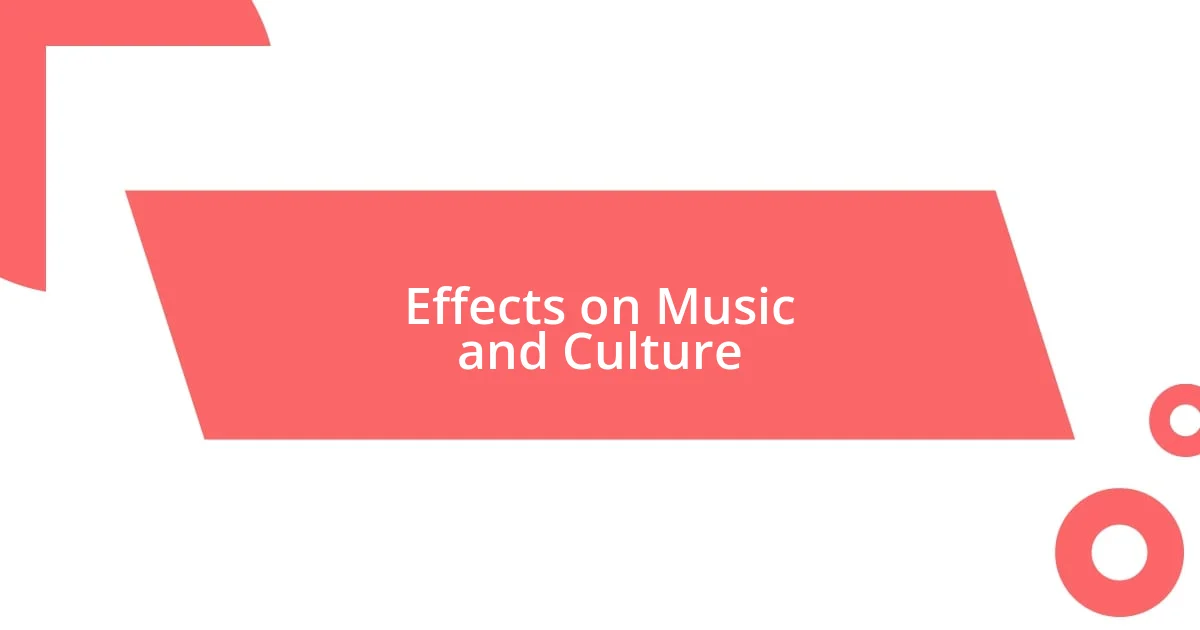
Effects on Music and Culture
Shifts in music and culture due to MTV’s genre changes have profoundly influenced not just the artists, but also fans like me. When hip-hop started to dominate in the late 90s, I vividly remember how it felt to experience a new cultural wave. It was exciting to see artists like Tupac and Missy Elliott redefining not just music but also fashion and language. Suddenly, my world expanded beyond rock and pop, as I found myself exploring beats and lyrics that spoke to issues I was beginning to understand in my own life.
As MTV diversified its lineup, it introduced audiences to various cultural narratives, blending musical genres with personal stories. I can recall flipping through channels and stumbling upon a documentary about Reggae and its roots in social justice. This was eye-opening for me; it led to deep conversations with friends about identity and activism, sparking my interest in music with a purpose. It made me ponder: how much power does music hold in challenging societal norms? The beats were infectious, but the messages left an imprint that encouraged me to engage more with the world around me.
The relevancy of genre shifts also prompted me to reflect on my personal style and tastes. I found myself curating playlists that meshed pop-punk with dancehall rhythms, creating a soundtrack that mirrored my eclectic interests. It raised questions about authenticity for me—was I being true to my roots or simply following trends? The beauty of MTV’s evolution was that it inspired countless individuals to blend influences, creating a rich tapestry of musical expression that felt both personal and universal.
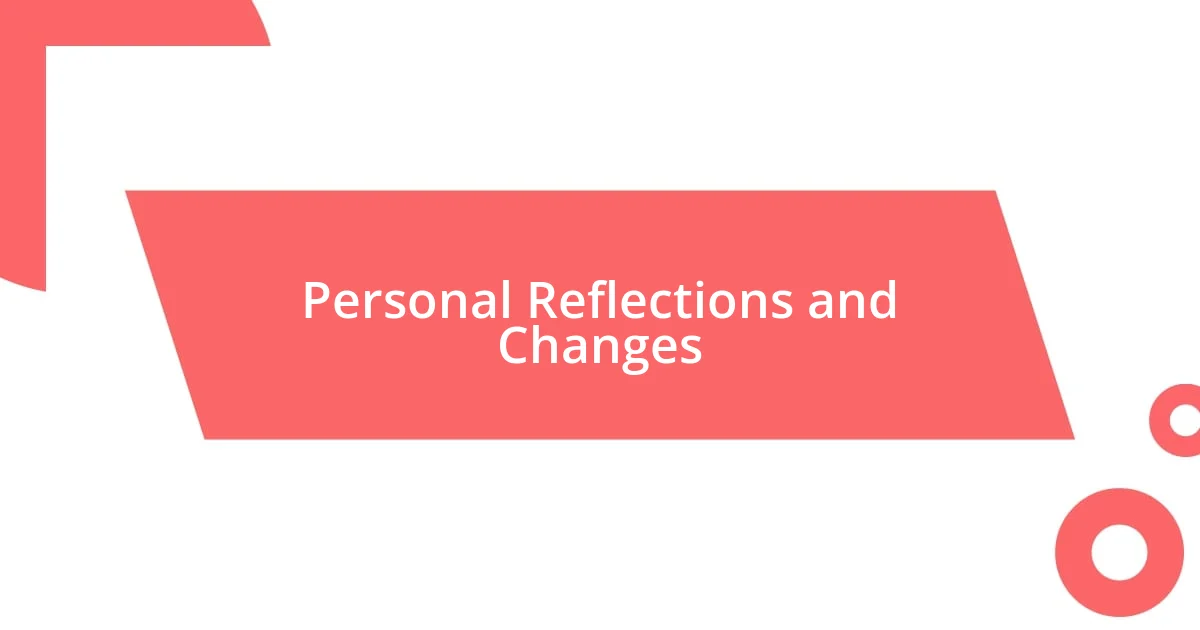
Personal Reflections and Changes
Reflecting on the evolution of MTV, I can’t help but feel nostalgic for how its shifts shaped my identity. Remembering the late-night jam sessions with friends, listening to everything from grunge to hip-hop, it felt like each genre spoke directly to some part of us. Those moments made me realize that music was more than just a backdrop; it was a catalyst for connection and self-discovery.
As reality shows began to dominate the airwaves, my perspective on celebrity and artistry shifted. I found myself gushing over the latest escapades of artists like the cast of “Jersey Shore,” but I also felt a pang of discontent about how personal drama overshadowed their art. Was I still in love with the music, or was I now more captivated by the lives behind it? I started to contemplate my own relationship with fame—did I admire their creativity, or was I entranced by the chaos of their reality?
This journey of genre shifts made me more aware of what I truly valued in music. As I immersed myself into different styles, I began to embrace a mix of genres that resonated with me emotionally. I would create playlists for every mood, blending the heartfelt strumming of acoustic with the bold beats of hip-hop. I often wonder—did these shifts in music reflect changes in who I was becoming? While I explored these sounds, I felt more confident in expressing my own identity, realizing that embracing diversity in music shaped not only my playlists but also my outlook on life.

Lessons Learned from MTV’s Journey
Lessons learned from MTV’s journey go beyond simple entertainment; they profoundly influenced how I view music and culture. When I first heard Eminem’s “Lose Yourself,” it resonated with my own struggles to find my place in the world. His lyrics were not just words to me—they were a mirror reflecting my ambitions and insecurities. I realized that music often articulates feelings we can’t always express ourselves, leading me to seek artists who tell stories that resonate deeply with my experiences.
As the genres evolved, I learned that authenticity can be fluid. I remember feeling conflicted when pop artists began collaborating with rap stars. It was fascinating to see boundaries blur, yet I found myself questioning: What’s genuine anymore? Those collaborations challenged me to think about my own cultural identity—whether I was willing to embrace the fusion of influences or cling to traditional definitions of music. In stepping back, I discovered that blending genres represented a richer spectrum of emotions and experiences that I could relate to.
MTV’s journey taught me that change can be a pathway to growth. I often think back to when I discovered the underground scene through late-night shows; those moments encouraged me to explore local gigs and connect with emerging artists. By engaging with different sounds and communities, I found transformative experiences that enriched my understanding of music’s power. It made me ask—how often do we limit ourselves by sticking to what’s familiar? Embracing the evolution of genres not only expanded my musical taste but encouraged me to engage with the world around me more fully.



